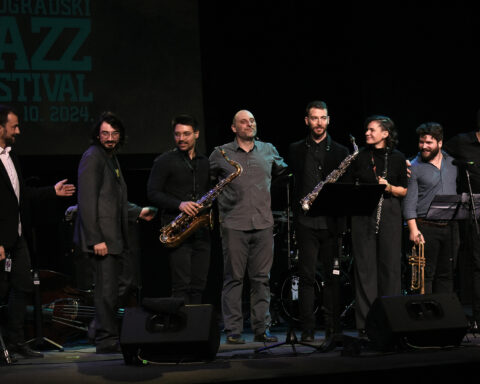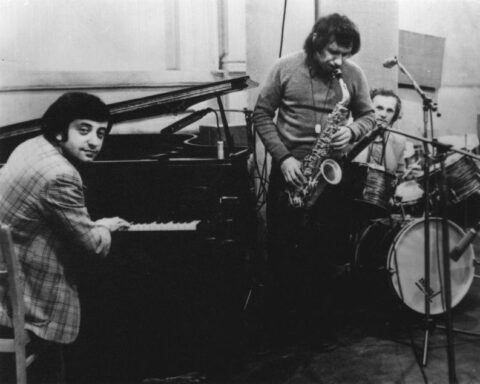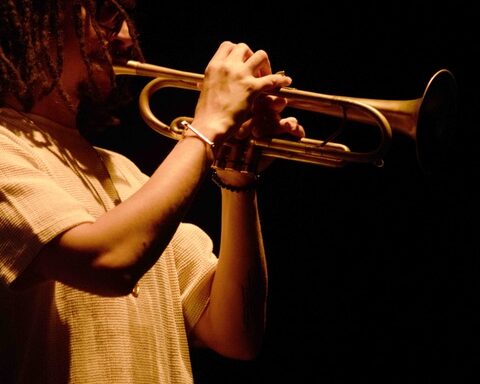Concert and festival producer Absolutely Live Entertainment shocked some JJA members in an e-mail promoting its upcoming Wayne Shorter concert at Town Hall (NYC). “(T)his will be a “no comp” show, [so] we are offering our industry and musician friends an opportunity to purchase tickets directly through our office,” the message read, seeming to remove what freelance writers and photographers consider an essential to their coverage. “Comp” or free admission to jazz performances is also widely acknowledged to be a major perquisite for jazz journalists.
“We are holding great seats and will not charge you the dreaded ticket service fees,” continued the letter from ALE principal Dan Melnick, who has been a supporter of the JJA Jazz Awards. “Tickets are $76 each and can be purchased by sending a check or by credit card.”
Considering that payment for concert reviews ranges from as little as nothing (online and in a significant number of music publications) to $50 (for print editions of some international jazz magazines) to a top of an estimated $250 (from major international newspapers — which typically assign salaried staffers and cover ticket costs), a “no comp” policy could significantly deter coverage of major performance presentations. With outlets for concert reviews already dwindling, “no comp” could result in no coverage.
In an e-mail to JJANews, producer Melnick clarified his “no comp” move:
If someone is on assignment, I will comp them. [Publicist Don] Lucoff is going to handle the PR and we will go through the list.The issue here, with this show particularly, is that we have a rather tight deal and I need to make sure that I sell every ticket possible so that I can meet my obligations to Wayne and to make this risk worthwhile for ALE. I am usually pretty liberal when it comes to comping so in this case I needed to head all the requests off at the pass.The truth is, as a presenter, I don’t really care so much about concert reviews. I need previews, which are less and less possible nowadays. I remember when I started out at FPI [Festival Productions, Inc.] 20 years ago, we used to get preview articles in the NYT. Now that is virtually unheard of. . . As a presenter, we want there to be full houses so that the artists have wonderful moments and so that more people get to hear, experience, enjoy and be attached to this music we work so hard to support. As a presenter who puts my own money on the line, with no institutional support, who doesn’t have a board and a 501c3 in place, and who doesn’t work for a performing arts center, I feel I am at the forefront of supporting jazz and the other music we present. And so, when I have a chance to present someone such as Wayne Shorter in an expensive city like NYC, I gotta’ hold the line.I offered biz associates and musicians a “buy one get one free” when I last presented Wayne at Carnegie Hal in Dec. ’08. People were very appreciative and we sold quite a few tickets (less than 100) but I was happy to do it. Town Hall is half the size of Carnegie and I just can’t do that here. So I figured this was the least I could do as I know that so many people want to hear this band every chance they get. I already have a bunch of requests from musicians and business folks and I expect more.
Jazz journalists, noting producers’ calls for advance coverage, might consider how to serve that function, basing articles about musicians about to appear in town on prior experience hearing them live or on record, phone interviews (cooperation of producer/publicist to set these up is in most cases necessary) or syndication of pieces written after having attended a touring act’s performance to publications in locales the tour will subsequently reach. One JJA member lamented the “no comp” policy, though, writing,
Jazz Times has stopped paying for concert reviews and now concert promoters want us to buy our own tickets? How I long for the days when a record company would not only cover your ticket but pop for a round of two drinks each for you and your plus one at the Bottom Line. Long gone, I guess.Funny, my rent was only $650 back when everything was free. Now that my rent has exactly doubled, mags start wanting free content and promoters cut out press tickets. This can’t go on too much longer, at least not for me.
The JJA is committed to helping jazz journalists find methods for continuing to be able to do the work of getting the word and image of jazz as it occurs now out to a larger public. Comments on “no comp” policies and strategies to write reviews — as well as advances — are welcome. JJA members are urged to join the discussion on this topic being held here; members must log in with their JJA passwords to participate.






There are only so many large-hall, big-ticket events like this per year, so in a way it's not wholly representative of what we face. But $76 is a lot to ask from everyone, not just critics. That's the larger issue.
I am seldom comped for shows.
It is a horror for freelancers. The end result of course is that editors will not assign the pieces and the concerts will not get written about. In the case of Wayne Shorter, Sonny Rollins and about a dozen more it won't matter. It will only hurt the "little guys" - the jazz musicians who will either lose coverage or will have to pay the management for the comps for the press that will matter to them most.
'Tain't just clubs and concerts. Even festivals are cutting back on press passes, access, etc.
Part of the problem, although no one wants to admit it, is that the definition of "journalist" has been seriously dumbed-down by technology in recent years. Melnick's caveat that a writer must actually be "on assignment" to get comped is revealing -- I'm pretty close to the folks who put on the Chicago Blues Festival, and I know for a fact that in recent years they've been utterly inundated with comp requests from self-described "journalists" and "critics" whose "assignments" are nothing more than their own desire to get their opinions aired on their own personal websites, blogs, etc. (Then there are all the fly-by-night "blues societies," each with its own newsletter or online "publication," and many of which seem to exist only to get their members free passes and backstage access at festivals.)
What all of this means, unfortunately, is that legit writers on real assignments (or legit freelancers who'll probably be able to place their pieces in legit publications after the fact) have gotten crowded out by the D.Y.I. "virtual jounalism" crowd. Sometimes it seems as if there are more bodies crushing together in the press area, the photo pit, or even backstage than there are in the audience. In light of this, Chicago's Mayor's Office of Special events have seriously tightened up their procedures for getting press access -- you need to jump throiugh several hoops to PROVE to them that (1) you're on a real assignment, and (2) the "publication" you're writing for actually exists somewhere outside of your own imagination or your own Facebook account.
That being said, though, the problem of payless reviews is a serious one, and I think it's getting worse. I got burned this last year by JT's "no pay for reviews 'cuz they're all online now" policy. I pitched a Chicago Jazz Fest review to them; they gave me the assignment; THEN, after I'd naively accepted it, they "reminded" me, "Oh, by the way, you do know that all of our reviews are online now and we don't pay for them, don't you?" Well, being a mensch and all that, I didn't back out of my commitment, and I did the gig for free -- but I still think it's a pretty underhanded way of treating writers.
Ditto. Photographers whose cost are usually pretty high because of 1.) transportation expenses to schlepp our equipment to gigs such as a Carnegie Hall concert where you need a 300mm lens and for those of us who are not as young as we used to be or have suffered bodily injuries so that we can't carry heavy bags up and down flights of subway stairs and need to take cabs and 2.) equipment maintenance and replenishing costs and 3.) processing costs (now even with digital-the time it takes for post processing is costly); point being, if we then have to absorb the costs of the ticket to cover a performance and then do all of this for free, who is going to be left to document the music? Well it seems that there are the doctors and lawyers and other highly paid professionals with the best equipment that money can buy and are passionate about the music and don't need the income from it, that are able to afford to keep shooting and perhaps that is the wake up call for those of us who have devoted our lives to the craft of music photography but did not prepare for the new world where we are expected to contribute our work for free and where everyone has a digital camera and fancies themselves a photographer. I hate to sound bitter but that's what it has come to and I for one can not continue to document the music I have spent over 30 years loving if the industry makes it too difficult to work with and having my work published just to keep my name alive is not good for my health.
Yes David, there are also a glut of shooters trying to get in to gigs for free under the guise of "DIY virtual journalism" and surely producers and promoters and the such have to control that but for the proven writers and photographers out there who have contributed so much for so long there should not be any limitations on them. These soldiers of jazz history should be welcomed, should be solicited and should be appreciated at any and every possible performance as even if the work is strictly archival for the time being, there will be one day that the images and the reviews and interviews will be needed and wanted. So to Dan and Don, who have always been wonderful to work with, and all the great long time publicists and promoters, you know who those journalists are and I'm sure you respect them and would not deny them access merely because there is no present publication willing to publish or pay for a picture or article, but with the understanding that the future is as precious as the present and past. I hope that we continue to have a mutually beneficial relationship.
Well said, Enid.
All our years in the trenches ought to count for something, even in an age when the concept of 'what have you done for me lately' has become more like 'what have you done for me in the last 15 minutes?'
Media outlets have seldom been generous to photographers over the years, and now that digital has democratized photography to the point where total amateurs can produce competent, occasionally even inspired (if not inspiring) work, we should not be surprised, though it is depressingly disappointing, that those same outlets will jump at the chance to get passable work for free from people who demand no more than to see their names in the photo credits, a much more attractive arrangement than dealing with those of us who also expect to see our names on checks.
History means nothing to people constantly under the gun to unceasingly feed new content into the maw of the web and those fewer and fewer antiquated publications still killing trees, nearly all of whom were cheapskates in the first place, and most are content to play to the 98% of the audience which either can't tell the difference or doesn't care. That leaves it to those of us who have been in it for the long run to keep working for that other 2%, and to continue our creative documentation of the music we love for both present and future use. We'll just have to find other work to pay our bills, a situation not unique to us in these times of media flux. This is not ideal, especially in our age group, but it does seem to be the situation we find ourselves in.
For a professional journalist, there is no such thing as a "complimentary ticket." That concept is that you get in free with no responsibilities, just like a friend of the band. A professional journalist receives a "press pass" or a "media pass" because they are working to publish through a media outlet (which includes web-based, radio, and print). The journalist is working for themselves, for an outlet and in the interests of the artist and the promoter. Doing a preview does not mean working off the press release, something that typically panders to hack writing. Previewing implies an interview and access to the artist.....or hearing them in another city. Actually, the promoter in this case is conceptually wrong: reviews assist the artist right down the career path. Properly written reviews also ad to the credence of the promoter. When I review, I work my butt off, and I am no different than the majority of JJA members. I'm glad to see the promoter recognizes journalists on assignment, but to repeat, he is not "comping" he is recognizing a professional relationship with journalists. -Svirchev